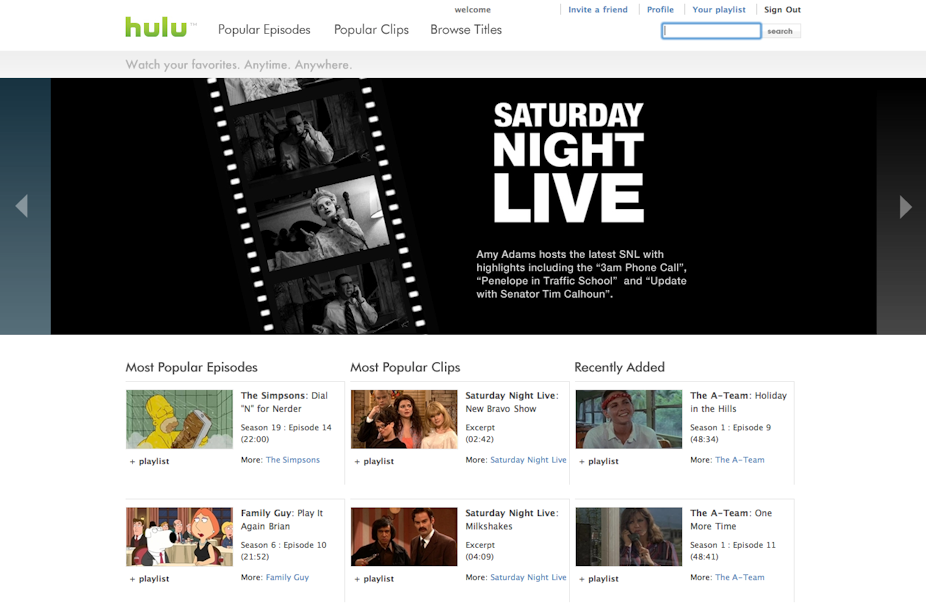In less time than it takes for the average teenager to get bored, Yahoo has put its acquisition of blogging site Tumblr behind it and moved onto its next potential target, Hulu. A couple of years ago, when it was considering whether to become a listed company, Hulu was valued between US$1-2 billion. Yahoo’s rumoured bid, which lies somewhere between US$600 million to US$800 million, falls well short of that.
Hulu is not that well-known outside of the US as the content it streams has been locked to that country and its territories. Currently owned by News Corp and Walt Disney Co, it allows the streaming of TV shows, movies and “webisodes”, with much of its content showing its age. The free version is ad-supported with a premium version that makes Hulu available on mobile platforms. Its advertising and three million subscribers to Hulu Plus [brought Hulu](http://money.cnn.com/2013/05/29/technology/hulu-takeover-rumors/index.html?section=money_topstories&utm_source=feedburner&utm_medium=feed&utm_campaign=Feed%3A+rss%2Fmoney_topstories+(Top+Stories) US$700 million in revenue in 2012, although Hulu has not disclosed its profits — if any.
It is easy to see this potential move by Yahoo as an attempt to cash in on a growing trend away from traditional TV and cable towards internet-based services, which are being increasingly viewed over computer and mobile devices. While the trend may be true, “regular” broadcast and cable TV is still by far the dominant way in which most people in the US at least view shows and movies in their homes. There are nearly 115 million households in the US with TV sets and only five million that qualify as not having a traditional TV (either free-to-air or cable). People are mostly supplementing their regular TV viewing with the use of other platforms. This trend is likely to continue for some time.
As part of the video streaming market, Hulu faces possibly insurmountable competition from Google’s YouTube and services from Amazon, Netflix and Apple, among many others. A recent estimate claimed that 33% of all peak internet traffic in the US is due to people streaming Netflix content; this compares with only 1.4% for Hulu and 1.8% for Amazon.
The other challenge that Yahoo could face if taking over Hulu is whether any content deals that it had negotiated with its current owners would continue, or at least continue under the same terms. Even if Yahoo used Hulu to create more original content, in the same way that Amazon and Netflix [are doing](http://money.cnn.com/2013/05/29/technology/hulu-takeover-rumors/index.html?section=money_topstories&utm_source=feedburner&utm_medium=feed&utm_campaign=Feed%3A+rss%2Fmoney_topstories+(Top+Stories), they would still need to continue to provide the same volume of content to drive ads for the day-to-day revenue.
Couple these challenges with the need to invest large amounts of money needed to expand Hulu outside of the US and the buying price of even $600 million starts looking less attractive. Indeed, the rumoured bid for Hulu from the Chernin Group was only $500 million.
It is difficult to see the sense in this acquisition from Yahoo’s perspective. They are in the midst of a move to refocusing themselves as a company and have just started on the task of assimilating Tumblr into their new structure. Taking a business that is not exactly effusing potential and trying to turn it around would seem like a forlorn wish at best. The puzzling thing about Yahoo’s interest in Hulu is trying to spot what aspect makes the acquisition a deal worth doing.
Another possibility is that this offer is not serious and isn’t actually intended to be a winning bid. If Yahoo really wanted Hulu, it could have “made an offer they couldn’t refuse”. What Yahoo may be doing is just using the opportunity to learn more about both Hulu and the market in general. It may be more serious for Hulu though, as time may be running out. Their CEO Jason Kilar, is on his way out — and Hulu’s owners may have decided that they too have had enough.

